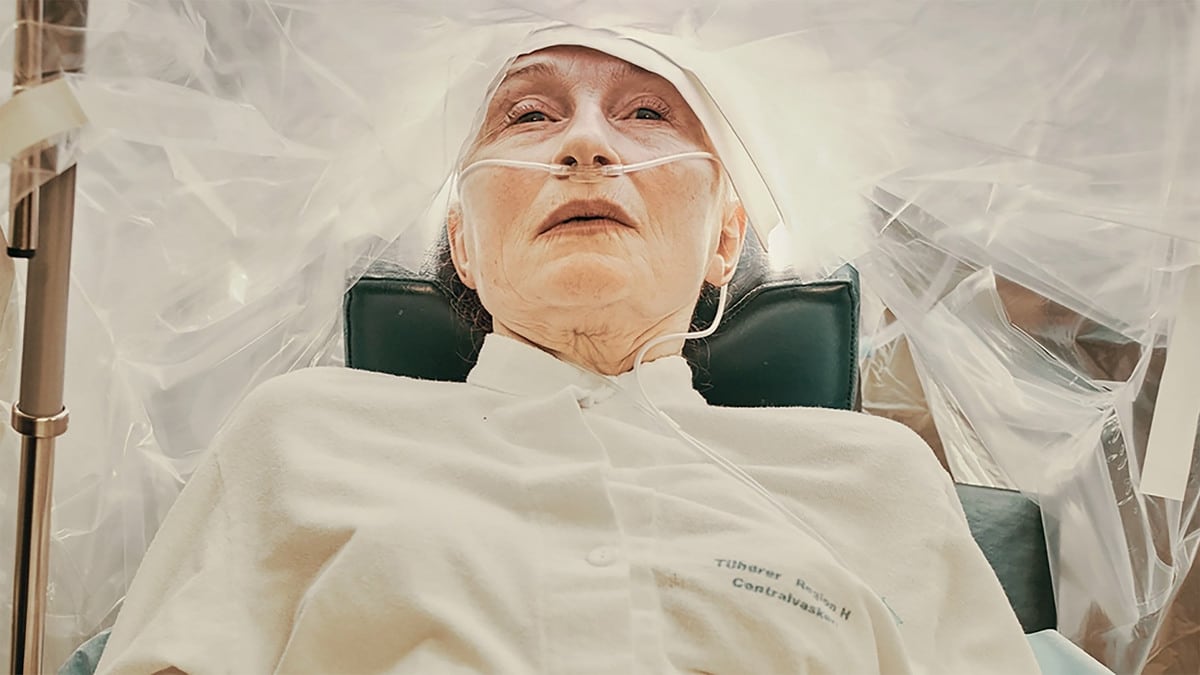Lars von Trier’s The Kingdom—whose first two seasons aired in 1994 and 1997—was an absolutely bonkers Danish blend of hospital drama and otherworldly thriller that gave David Lynch’s Twin Peaks a run for its money in auteur eccentricity. It also had a delightfully demented sense of humor. That—along with its mind-boggling madness—remains firmly intact in the series’ long-awaited and grand return, The Kingdom Exodus, a five-part follow-up helmed by von Trier and Morten Arnfred that (along with its prior two runs) premieres on Nov. 27 on Mubi. Fans of deranged delirium won’t want to miss it.
As befitting a work by the Antichrist and The House That Jack Built director, The Kingdom Exodus is a provocative piece of batshit showmanship, and one that immediately begins in self-reflexive fashion, with elderly Karen (Bodil Jørgensen) watching the conclusion to season two of The Kingdom on TV, ejecting her DVD, and proclaiming, “How can they peddle such half-baked hooey. That’s no ending.”
She’s right—the show’s sophomore outing concluded on a potentially apocalyptic cliffhanger that, for the past 25 years, remained unresolved. Ever the prankster, von Trier has no interest in definitive outcomes, nor in fashioning his long-running saga in logical terms—notions that he cops to in one of his trademark jibber-jabber credit-sequence monologues (now delivered behind a curtain, so that only his shoes are visible), when he states, “There’s no end to the nonsense, and where does it all lead?”
The Kingdom Exodus dispenses a host of answers to its mysteries, but, like the questions themselves, they’re wholly irrational. Von Trier’s series is a go-with-the-flow affair that’s exhilarating for its inimitable blend of wackadoo medical-profession comedy, culture-clash warfare, and quasi-biblical paranormal pandemonium. With its former protagonist, hypochondriac sleuth Drusse (Kirsten Rolffes), having perished in an elevator accident, von Trier turns his attention to Karen, a new meta-Miss Marple who—after bingeing The Kingdom—sleepwalks from her apartment to the actual, newly renovated Kingdom hospital.
Whether she’s a spirit or merely dreaming is up for debate, but, once inside, she sets about searching for Little Brother (Udo Kier), the gangly-limbed mutant ghost baby of neurosurgeon Judith (Birgitte Raaberg). While Judith ostensibly killed her offspring, Karen doesn’t believe that Little Brother is dead, although she is worried that he’s drowning. That fear propels her into the bowels of the Kingdom, where she encounters a statue of Ogier the Dane with the Latin inscription, “See and heed. Exodus is a double-edged sword.”
On her quest, Karen partners with orderly Balder (Nicolas Bro), who’s called Bulder because he looks just like Drusse’s portly pal with the same name (played by Jens Okking). Such doubling is par for the course in The Kingdom Exodus, which also fixates on Helmer Jr. (Mikael Persbrandt), who follows in his dad Stig Helmer’s (Ernst-Hugo Järegård) footsteps by transferring to the Kingdom, where he immediately finds much to loathe about his colleagues.
That’s especially true of Pontopidan (Lars Mikkelsen), an administrative weirdo who treats his aching neck with bags of frozen peas, and Naver (Nikolaj Lie Kaas), a psychotic surgeon who’s constantly making senseless ultimatums. Helmer Jr. is a Swede who hates the Danes even more than his father famously did, and von Trier uses that antipathy—which eventually drives Helmer to join a Swedish Anonymous support group alongside flirty Anna (Tuva Novotny)—to mock both countries with equally ruthless gusto.
As before, The Kingdom Exodus is rife with moldy sepia colors, handheld camerawork, canted visual angles, and conflicts between contrasting forces: science and the supernatural, Swedes and Danes, and light and dark. The last of those pits Karen and company against the Grand Duc (Willem Dafoe), an emissary of Satan who transforms innocents into his minions via a magic coin, creates malevolent doppelgangers of Karen and Balder, and takes the form of an owl—for what reason, I cannot tell you.
Karen also uses the hospital’s paternoster to travel to the ancient bleach-pond swamp that predated the construction of the Kingdom, where she discovers both critically injured Mona (Laura Christensen) still moaning and playing with her blocks, and Little Brother, who’s now grown into a giant head that goes by the apt name Big Brother. All the while, various original characters appear and disappear at random, and von Trier provides mystifying Greek-chorus commentary via a bizarre dishwasher (Jesper Sørensen) and his robot-arm companion (Jasmine Junker), who breaks plates as frequently as she spouts mystical riddles.
The Kingdom Exodus’s big picture is borderline-inscrutable, and its workplace action is only slightly less loopy. Von Trier’s narrative detours include, but are not limited to, incorrect surgical procedures, scuffles between colleagues, and Helmer Jr. voicing absurdly over-the-top progressive opinions. At the same time, he deals with Anna’s sexual harassment charges by turning to a Swedish lawyer (Alexander Skarsgard) who represents both sides of the suit and who conducts business out of a women’s bathroom.
It’s fitting that Karen suffers from somnambulism and must sleep in order to hear the pulse of Big Brother—whose very being is in the Kingdom’s walls, and whose enormous heart is located in an arbitrary closet—since von Trier’s story operates according to a crazy sort of dream logic that’s comprehensible in the moment (relatively speaking) but is, upon reflection, by and large baffling.
The Kingdom Exodus is satire, nightmare and hoax all rolled into one, and though familiarity with its preceding installments is a must, such knowledge doesn’t result in lucidity. From running gags about corporate phone systems, unattainable parking spaces and gender pronouns, to recurring bits about Volvos, fascist terrorism plots and Naver wanting to scoop his eyeball out with a spoon—not to mention an out-of-left-field reference to Blade Runner—the series is ridiculous to a degree that’s difficult to fathom and easy to love.
Overflowing with overt and subtle echoes of its predecessors (which are revisited in intermittent flashbacks), and culminating with fire, brimstone, and other berserk twists and turns, it doesn’t just embrace psychosis as a subject; it feels intent on producing it in viewers.
Even in this most bountiful of television eras, The Kingdom Exodus stands alone—or, rather, shoulder-to-shoulder with Lynch’s Twin Peaks: The Return—as a peerlessly haunting, hilarious and nutty expression of its creator’s artistic impulses. Rejoice that the chill and the damp have returned, and that, thanks to another cliffhanger, there will hopefully be more opportunities in the future to, per von Trier, “take the good with the evil.”







